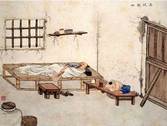 |
Stories about exemplary filial conduct abound in Chinese history. The Twenty-Four Examples of Filial Piety were chosen and compiled by Guo Jujing from the Fujian Province during the Yuan Dynasty (1280-1368 CE) while he was mourning the death of his father. He recounted the feats of filial children towards their parents from the age of the primordial Emperor Shun down to his own era. Even today, these stories form an important part of orthodox Chinese virtue.
In the Jin Dynasty (265-420 A.D.), a respectful eight-year-old boy named Wu Meng served his parents with devoted compliance. His family was extremely poor and could not afford to install any mosquito netting. On hot summer nights the mosquitoes would come swarming in as thick as smoke. The little boy would remove his shirt and let the insects land on his bare skin. He would watch then drink their fill of his blood, and fly away without raising a hand to shoo them off, no matter how painfully they stung him. Wu Meng wasn’t a fool, but why didn’t he brush the bugs away?
He knew that his parents had no netting at their bedside. If he drove the mosquitoes away from his body, they would surely fly over and wake up his mother and father with their stinging. So the devoted son simply let the mosquitoes drink his blood instead.
So that his parents wouldn’t know about his sacrifice and demand that he stop, the boy would wake up earlier than they, slip his shirt over his swollen torso, and return to his own bed. But one morning, being tired from loss of sleep, he forgot to wake up and pull on his shirt. His father arose and found his son asleep by his bed. He looked at the boy’ s pathetic, mosquito-bitten skin that was covered with red welts, and understood immediately what Wu Meng had done for them. Mr. Wu woke up his wife and told her the story. The two parents, deeply moved by their son’s unselfish concern for them, began to cry. They were so touched that the neighbors could hear their sounds of sobbing. From all sides the neighbors gathered to investigate the matter, and learned about Wu Meng’s sacrifice on behalf of his parents.
Everyone thought that the boy’s attitude of filial respect was most remarkable, especially for one only eight years old. Someone reported the incident to the local magistrate, who wrote a memorandum to the Dragon Throne, to inform the imperial court. The matter thus came to the attention of the Emperor, who rewarded Wu Meng with a scholarship to the imperial academy. Further, he gave the family a set of mosquito nets and a stipend, so that they never again lacked the necessities of life.
A verse in his honour says,
Insects by the thousands, yet he wouldn’t raise a hand.
“Let them drink my blood and fill their bellies,
Just don’t disturb my parents while they sleep!”
* * *
You are welcome to print and circulate all articles published on Clearharmony and their content, but please quote the source.










 more ...
more ...